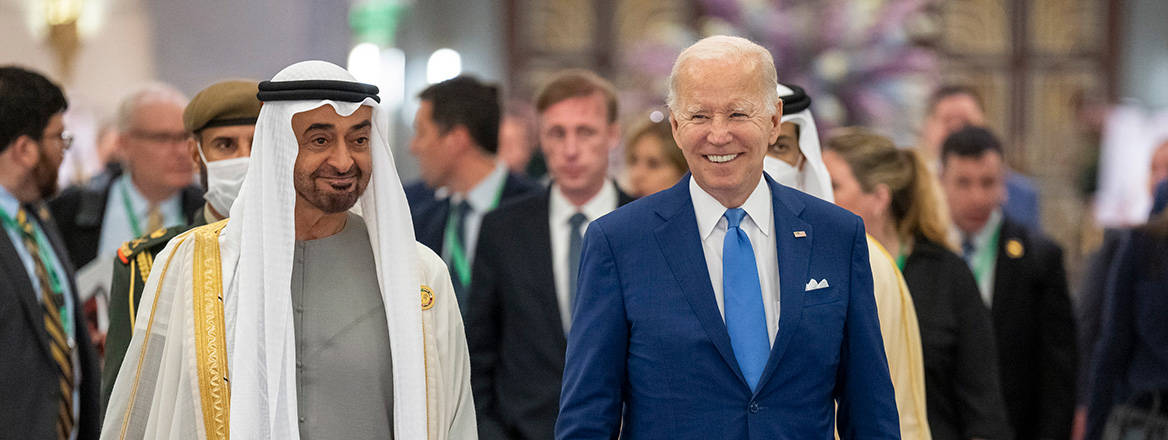RUSI
|
|
Defence and Connectivity: The UAE Becomes Washington’s Super Ally
The UAE's designation as a major US defence partner enhances its strategic position in the Gulf, bolstering ties with Washington amid Middle Eastern instability.

The UAE has become the US’s ‘super ally’ after being designated by Washington as a major defence partner. Such a status, previously granted only to India, offers Abu Dhabi unmatched opportunities for cooperation with the US in the defence field. It also enhances the UAE’s role as connectivity hub and security pillar across continents. In the Gulf, it reinforces the Emirati strategic advantage over Saudi Arabia, since the Israel–Hamas war and regional instability have slowed – and in some cases stopped – both Riyadh’s regional strategy (including its diplomatic normalisation with Israel) and its pursuit of its international goals (such as a new defence pact with the US).
On 23 September 2024, US President Joe Biden designated the UAE as a major defence partner during the first-ever visit to Washington by a president of the UAE. In 2016, this status was also assigned to India. Without providing further details, the US–UAE joint leaders’ statement affirms that the designation ‘will allow unprecedented cooperation through joint training, exercises, and military-to-military collaboration’, including ‘between the military forces of the United States, the UAE, and India’. The UAE and India already have a comprehensive strategic partnership and regularly conduct joint military exercises.
The designation builds upon two political achievements, both mentioned in the statement. The first is the deepening of the US–UAE security partnership and cooperation in advanced technology and acquisition; the second arises from the US and UAE’s shared interest in preventing conflicts and pursuing de-escalation in the Middle East.
From the UAE’s perspective, deepening its relations with Washington provides several benefits, including a powerful ally at a time of heightened instability in the Middle East
Against this backdrop, the choice by the Emirati AI holding G42 to disinvest from Chinese companies in February 2024 was a watershed moment in the US–UAE relations. In the context of the US–China systemic rivalry, the deepening of cooperation on advanced technologies and AI between the UAE and China risked compromising Abu Dhabi’s access to US innovations in the field.
The disinvestment choice by the UAE resulted in April 2024 in a notable AI partnership between Microsoft and G42 worth $1.5 billion, which paved the way for President Mohammed bin Zayed Al Nahyan’s visit to the White House. The fact that the UAE has chosen on this occasion to transcend its multipolar, multi-aligned foreign policy emphasises how crucial technology is for its strategy.
Many entrenched factors help to explain why the UAE and the US have opted to strengthen their defence cooperation. From the UAE’s perspective, deepening its relations with Washington provides several benefits, including: a powerful ally at a time of heightened instability in the Middle East, and potentially in the Gulf due to the direct attacks between Iran and Israel; access to the most sophisticated technologies in order to pursue its ambitious national goals; and strengthening its strategic advantage over Saudi Arabia, whose regional strategy has been thwarted in the aftermath of the 7 October attacks, delaying at least the timing of any diplomatic normalisation with Israel, which was also a pillar of its proposed new defence pact with the US.
For the US, designating the UAE as a major defence partner has a number of advantages, including: bolstering its containment strategy vis-à-vis China in the Gulf; building a network of US 'super allies' working together in the Western Indian Ocean (the UAE and India) to advance connectivity, maritime and regional security; and crafting a new cooperation scheme with and between major defence partners to advance collaboration while, on the contrary, the West Asia Quad and the India-Middle East-Europe Economic Corridor look increasingly challenged by Middle Eastern instability.
The building of a network of US 'super allies' working together in the Western Indian Ocean for connectivity and regional security goals is a long-term endeavour, which serves US interests regardless of who is in power at Washington
Stressing that the UAE and the US are ‘dynamic strategic partners’, the joint statement also frames the Emirati designation as a way ‘to further enhance defence cooperation and security in the Middle East, East Africa, and the Indian Ocean regions’. Furthermore, the US ‘recognizes the United Arab Emirates’ leadership’ in ports, mines and logistics hubs, underlying the importance of ‘ongoing efforts to cooperate on strategic investments in hard infrastructures and critical minerals-supply chain in Africa’.
This fits perfectly with the UAE’s strategic vision based on connectivity, and with its network-oriented foreign policy aimed at building cooperation bridges across continents (such as the Trilateral Cooperation Initiative with India and France) to maximise the UAE’s role as a hub between the Middle East, Asia and Africa.
Finally, the building of a network of US 'super allies' working together in the Western Indian Ocean for connectivity and regional security goals is a long-term endeavour, which serves US interests regardless of who is in power at Washington. It also acknowledges the UAE’s role as a regional middle power, further feeding its global aspirations.
The views expressed in this Commentary are the author’s, and do not represent those of RUSI or any other institution.
Have an idea for a Commentary you’d like to write for us? Send a short pitch to commentaries@rusi.org and we’ll get back to you if it fits into our research interests. Full guidelines for contributors can be found here.
Original article link: https://rusi.org/explore-our-research/publications/commentary/defence-and-connectivity-uae-becomes-washingtons-super-ally


